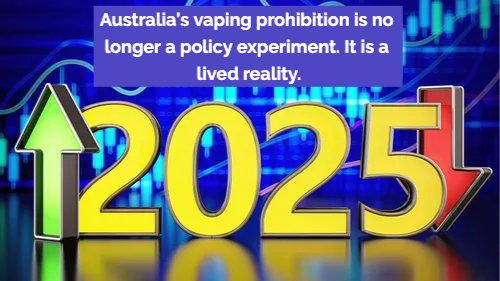Becky Freeman’s Commentary: A Masterclass in Ideological Stubbornness Over Practical Public Health
- Alan Gor

- Jul 1, 2025
- 4 min read

Alan Gor 1 July 2025
"I can see seven smoke shops from my bus stop - governments must act"
Becky Freeman’s latest commentary is a prime example of what happens when ideology trumps pragmatism, a sweeping treatise full of impassioned rhetoric but light on workable solutions. It reads more like a manifesto for prohibition than a roadmap to reduce smoking, completely divorced from the lived realities of policymakers, enforcement agencies, retailers, and ordinary Australians.
Let’s be clear: we all agree smoking is deadly. But we differ, and where Freeman’s logic collapses is how to reduce smoking without creating unintended harm. Freeman continues to push the illusion that simply tightening the screws with ever-higher excise, more aggressive enforcement, and licensing schemes will collapse the illicit tobacco market and usher in a smoke-free utopia.
This is fantasy.
The Realities of the Black Market
What Freeman and her ideological allies fail to acknowledge is that her preferred strategy is actively fuelling the very crisis she’s now decrying. We’re not seeing a rise in illicit tobacco because enforcement is weak. We’re seeing it because the cost of legal cigarettes in Australia is the highest in the world, and consumer-friendly, low-risk alternatives like vaping have been legislated into near-oblivion.
A single pack of legal cigarettes now costs $40–60, while black market packs sell for $10–15. In what economic universe is this supposed to discourage criminal enterprise? And more importantly, how can anyone with a straight face claim this model helps the people most at risk — those on lower incomes who smoke and want to quit but now face a financial wall and few viable options?
That’s not an enforcement failure. That’s a policy failure.
Where’s the Compassion?
Freeman’s solution? Double down. Increase penalties. Prosecute landlords. Reduce the number of tobacco outlets. Raise the licensing bar. Essentially, treat smoking and vaping as criminal justice problems instead of health issues. This is textbook prohibitionism, and we’ve seen exactly where it leads: criminal growth, community fear, market distortion, and worse health outcomes.
Nowhere in her commentary is there space for compassion for the reality that many smokers are not criminals but human beings trying, and often failing, to quit. Nowhere does she acknowledge that her ongoing resistance to accessible vaping products has contributed directly to the flourishing black market we now face.
Vaping: The Omitted Solution
Freeman notes, “If we see any increases in smoking, that would be very alarming.” Well, be alarmed, Becky. Because in workplaces, in families, and across communities, former vapers have returned to smoking, because the vaping products they relied on to stay off cigarettes are no longer legally or practically accessible.
Vape shops have been shuttered. Open-system devices and e-liquids are gone. The few options that remain must be accessed via a costly, convoluted, medicalised prescription model. Meanwhile, pharmacies are not stocking the full range of products people were once using successfully. Some pharmacists won’t supply them at all. And while all this plays out, the illicit market continues to thrive, selling unregulated vapes to anyone, no questions asked.
The result? Smokers and former smokers are turning back to cigarettes in droves.
And yet, not once in Freeman’s commentary does she meaningfully engage with the concept of harm reduction. Not once does she reference the substantial evidence showing that access to well-regulated nicotine vapes reduces smoking. Not once does she acknowledge that the sharpest decline in Australian smoking rates coincided with increased access to vaping between 2019 and 2022.
The omission is glaring. And telling.
A Dangerous Blind Spot
Freeman’s public health model appears to rest on an outdated idea: that all nicotine use is inherently bad, and the only acceptable goal is complete abstinence. This is a dogmatic, moralistic stance that ignores decades of harm reduction science, the same science that underpins our strategies for managing drug use, alcohol, and even sexual health.
Harm reduction isn’t about creating risk-free options. It’s about creating lower-risk options for people who would otherwise engage in far riskier behaviour. And when it comes to smoking, the data is crystal clear: vaping is substantially less harmful than lighting up a cigarette.
To borrow Freeman’s own phrase: “It should not be so easy and commonplace to sell such an addictive and deadly product.”
We agree on cigarettes.
However, it should be easy to access the far less deadly product that helps people quit.
Australia’s Global Standing Is Deteriorating
Australia was once seen as a global leader in tobacco control. But that status is eroding. While other countries like the UK, New Zealand, and Sweden have embraced harm reduction with regulated vape markets, Australia has regressed into ideological purity. The result is a national strategy that ignores lived experience, criminalises users, and clings desperately to failing policies.
What we’re witnessing isn’t health leadership, it’s public health dogma masquerading as evidence-based policy.
The Bottom Line
This isn’t about protecting reputations, bureaucracies, or academic prestige. It’s about saving lives. And that starts with honesty, not deflection. It starts with acknowledging the failure of punitive-only strategies. It starts with taking responsibility for the unintended consequences of ideologically driven laws. And above all, it starts with offering smokers safer, accessible alternatives, instead of pushing them toward crime or relapse.
Becky Freeman’s vision is not one of health — it’s one of punishment, denial, and delay. And it’s time we called it what it is.


